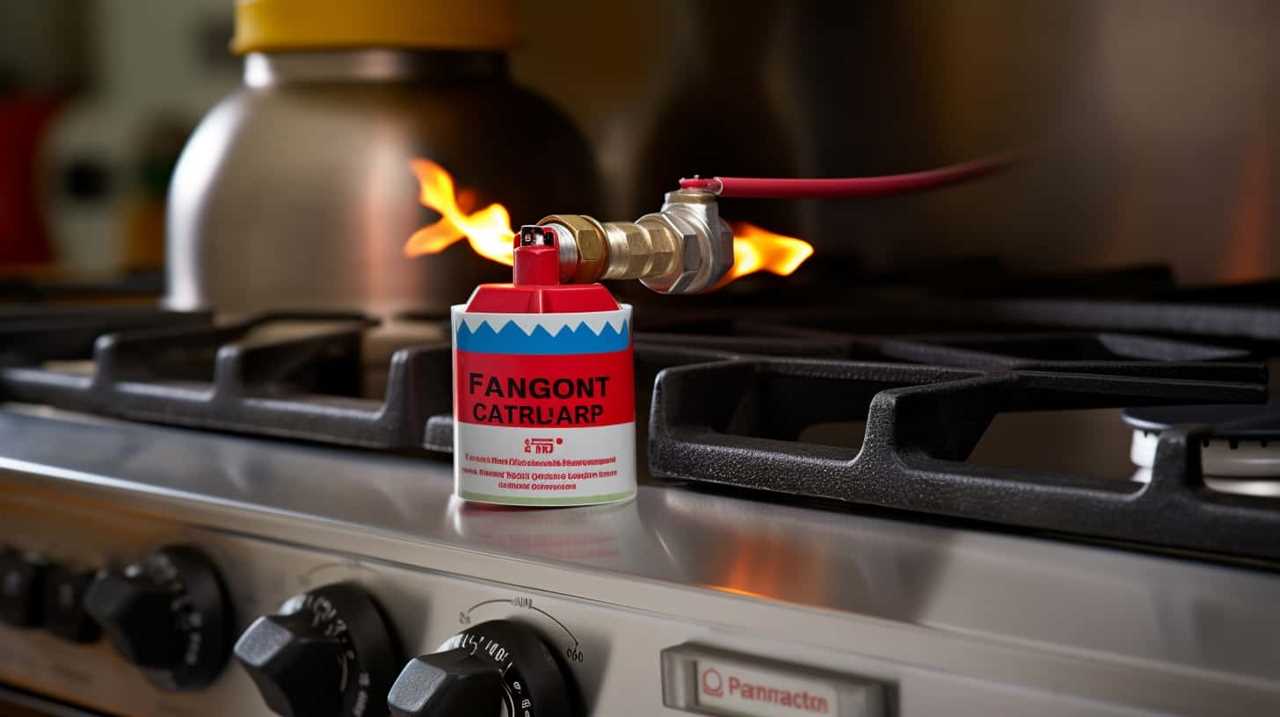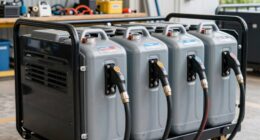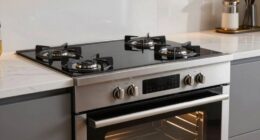As consumers, we eagerly anticipate the arrival of our new appliances, imagining a smooth delivery process. Yet, the actual outcome is frequently a frustrating ordeal characterized by delays and uncertainties.
So, why are appliance delivery delays becoming increasingly common? The answer lies in a perfect storm of factors, including heightened demand, supply chain disruptions, shortage of delivery personnel, manufacturing delays, global shipping challenges, increased online ordering, limited inventory availability, inefficient scheduling and logistics, and a lack of communication and transparency.
Let’s explore these complexities and seek mastery over this perplexing issue.
Key Takeaways
- Increased demand for appliances and supply chain disruptions contribute to appliance delivery delays.
- Shortage of qualified delivery personnel affects the timely delivery of appliances.
- Manufacturing delays and component shortages hinder the production and availability of appliances.
- Production line challenges, global shipping challenges, and limitations in warehouse and distribution centers also contribute to appliance delivery delays.
Increased Demand for Appliances
We have seen a significant rise in the demand for appliances. As a result, sales of appliances have increased exponentially in recent years.

This surge in demand can be attributed to changes in consumer behavior. Customers now prioritize convenience and efficiency, leading them to invest in appliances that simplify their daily lives.
With the advancement of technology, appliances have become more sophisticated and offer a wide range of features to cater to different needs. Consumers are now seeking appliances that not only perform their basic functions but also provide additional benefits, such as energy efficiency and smart connectivity.
These factors have contributed to the increased sales of appliances and have prompted manufacturers to continually innovate and improve their products to meet the evolving demands of customers.
Supply Chain Disruptions
Due to the increased demand for appliances, supply chain disruptions have become a significant challenge in ensuring timely appliance delivery. Here are four reasons why supply chain disruptions occur and impact delivery times:
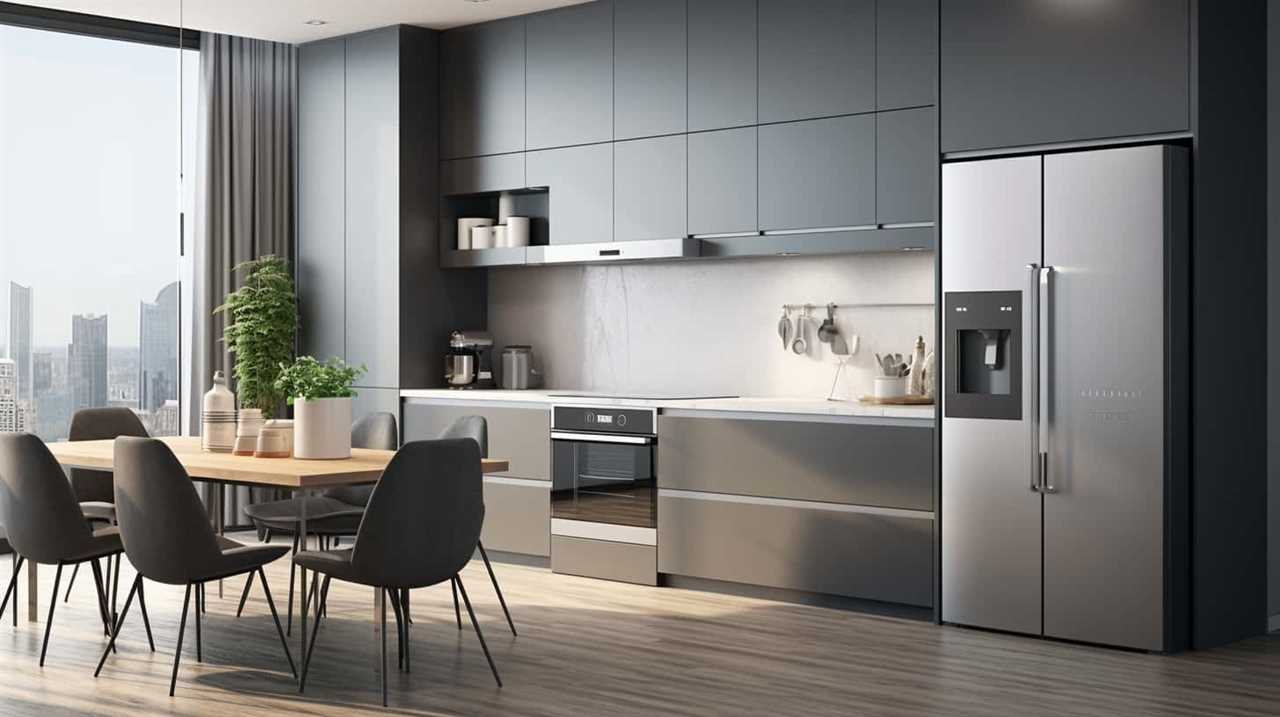
- Supply chain optimization: As companies try to streamline their operations and reduce costs, they may face challenges in finding the right balance between efficiency and resilience. This can lead to bottlenecks and delays in the supply chain.
- Transportation costs: Rising transportation costs, such as fuel prices and driver shortages, can put pressure on the supply chain. Companies may need to make difficult choices, such as prioritizing certain deliveries or using alternative transportation methods.
- Inventory management: Maintaining optimal inventory levels is crucial for smooth operations. However, disruptions in the supply chain can lead to shortages or excess inventory, both of which can impact delivery times.
- External factors: Unexpected events like natural disasters, political unrest, or global pandemics can disrupt supply chains worldwide. These external factors can cause delays in manufacturing, shipping, and delivery processes.
Shortage of Delivery Personnel
Appliance delivery delays can be attributed to a shortage of delivery personnel. The current labor shortage has made it challenging for companies to find enough qualified individuals to handle the increasing demand for appliance deliveries. As a result, customers may experience delays in receiving their purchases.
The shortage of delivery personnel has created a bottleneck in the supply chain, causing logistical challenges for companies trying to meet customer expectations. It’s important for companies to address this issue by implementing strategies to attract and retain delivery personnel, such as offering competitive wages and benefits packages. By doing so, they can ensure a smooth and efficient delivery process for their customers.
However, the shortage of delivery personnel isn’t the only factor contributing to appliance delivery delays. Manufacturing delays also play a significant role in the overall problem.
Manufacturing Delays
Manufacturing delays are a major factor contributing to appliance delivery delays. Supply chain disruptions, such as raw material shortages and transportation challenges, have significantly impacted the production process.

Additionally, the global component shortage has made it difficult for manufacturers to procure necessary parts, further slowing down production. These challenges on the production line have created a ripple effect, causing delays in the availability and delivery of appliances to customers.
Supply Chain Disruptions
In our experience, supply chain disruptions, specifically manufacturing delays, have been a major contributing factor to appliance delivery delays. These disruptions can occur due to various reasons, including:
- Raw Material Shortages: When there’s a scarcity of essential raw materials, it can lead to a delay in the manufacturing process. This can be caused by factors such as transportation issues or unexpected spikes in demand.
- Production Bottlenecks: Manufacturing delays can also be caused by bottlenecks in the production process. These bottlenecks can occur when there’s a breakdown in machinery, shortage of skilled labor, or inefficient production planning.
- Logistics Challenges: Transportation and logistics play a crucial role in the supply chain. Delays in shipping or distribution can have a significant impact on the overall delivery timeline, especially when appliances need to be transported over long distances.
- Quality Control Issues: Stringent quality control measures are essential to ensure that appliances meet the required standards. If there are any defects or issues identified during the manufacturing process, it can lead to additional delays as the products need to be rectified or replaced.
Component Shortage Impact
As we dive into the impact of component shortages on manufacturing delays, it’s important to consider the significant role these shortages play in disrupting the supply chain. The current component shortage has had a profound effect on the production of appliances, leading to increased manufacturing delays. This is primarily due to the increased demand for appliances coupled with the limited availability of essential components.
To illustrate the gravity of this issue, let’s take a look at the table below:

| Component | Impact | Solution |
|---|---|---|
| Microchips | Delays in production and assembly | Sourcing alternative suppliers or redesigning parts |
| Semiconductors | Longer lead times and reduced production | Prioritizing orders based on customer demand |
| LCD Screens | Limited availability and increased costs | Exploring partnerships with multiple suppliers |
These shortages have caused a ripple effect throughout the entire manufacturing process, resulting in longer wait times for customers. It is crucial for appliance manufacturers to address these component shortages to fulfill the increased demand and minimize manufacturing delays.
Production Line Challenges
We’re facing some challenges on our production line that are causing delays in manufacturing. We understand that these delays can be frustrating for our customers, and we apologize for any inconvenience caused.
Here are the key factors contributing to the current production line challenges:
- Production line optimization: We’re continuously working towards optimizing our production line to improve efficiency and reduce delays. This includes implementing new processes, technologies, and automation to streamline operations.
- Workforce management: Ensuring we’ve a skilled and well-trained workforce is crucial for maintaining a smooth production line. We’re actively investing in training programs and hiring additional staff to meet the increasing demand.
- Equipment maintenance: Regular maintenance of our production equipment is essential to prevent breakdowns and minimize downtime. We’re constantly monitoring and upgrading our equipment to ensure it operates at peak performance.
- Supply chain disruptions: External factors such as component shortages or transportation delays can impact our production line. We’re actively working with our suppliers to mitigate these disruptions and find alternative solutions.
Please be assured that we’re committed to resolving these challenges and delivering your appliances as soon as possible. Thank you for your patience and understanding.

Global Shipping Challenges
Our team has encountered several global shipping challenges while delivering appliances.
In today’s interconnected world of global trade, cargo congestion has become a major obstacle. The increasing demand for appliances, combined with limited shipping capacity, has led to delays in delivery.
Cargo congestion occurs when there’s a high volume of goods waiting to be loaded and unloaded at ports, causing bottlenecks and delays in the shipping process. This congestion is further exacerbated by factors such as labor shortages, port inefficiencies, and disruptions in supply chains.
These challenges not only impact the timely delivery of appliances to our customers but also increase transportation costs and create logistical complexities.

We’re actively working with our shipping partners to find solutions and ensure the smooth and efficient delivery of appliances despite these global shipping challenges.
Warehouse and Distribution Center Limitations
To address the challenges posed by global shipping congestion, we’ve encountered limitations in our warehouse and distribution centers. These limitations primarily revolve around warehouse capacity and transportation constraints. Here are a few key points to help you understand the current situation:
- Warehouse capacity: Due to the surge in demand for appliances, our warehouses are operating at maximum capacity. This means that there’s limited space available to store incoming shipments, resulting in delays in processing and dispatching orders.
- Transportation constraints: The current shipping congestion has also impacted our ability to transport appliances from our warehouses to the delivery destinations. Limited availability of trucks and drivers, along with increased transit times, have further contributed to delays in appliance deliveries.
- Prioritization of orders: In order to mitigate these limitations, we’ve implemented a priority system to ensure that urgent orders are fulfilled first. While this helps expedite deliveries for some customers, it may result in longer wait times for others.
- Continuous improvement efforts: We’re actively working on optimizing our warehouse operations and exploring alternative transportation solutions to overcome these limitations. Our goal is to improve efficiency and minimize delays to provide you with the best possible delivery experience.
We understand the frustration that delivery delays can cause and sincerely apologize for any inconvenience caused. Rest assured, we’re committed to resolving these limitations and delivering your appliances as quickly as possible.
Weather and Natural Disasters
Delays in appliance delivery can also be attributed to unpredictable weather conditions and the occurrence of natural disasters. When severe weather strikes, such as hurricanes, blizzards, or major storms, it can disrupt transportation networks and cause significant delays in the delivery process.

In addition to the physical barriers created by extreme weather, natural disasters can also result in infrastructure damage, such as road closures or power outages, further impeding the delivery of appliances. These unforeseen events can have a cascading effect on the entire supply chain, causing delays at every stage of the process.
While companies often have insurance coverage to mitigate some of the financial losses incurred during such events, the impact on delivery schedules can still be significant. It’s important for customers to understand that these delays are beyond the control of the delivery service providers and to be patient and understanding during these challenging times.
Increased Online Ordering
Here’s why increased online ordering has contributed to appliance delivery delays.
Firstly, the surge in online shopping has led to supply chain challenges, as retailers struggle to keep up with the high demand. This has resulted in delays in the availability and delivery of appliances.

Secondly, managing customer expectations has become more challenging, as customers want fast and reliable delivery, but the increased volume of orders makes it difficult for retailers to meet these expectations.
As a result, delays in delivery have become more common as retailers work to address the challenges posed by increased online ordering.
Supply Chain Challenges
Our experience with appliance delivery delays has highlighted the supply chain challenges caused by the surge in online ordering. As customers, we expect our appliances to be delivered promptly, but the current demand has put a strain on the supply chain. Here are four key challenges that arise from increased online ordering:
- Increased transportation costs: With more orders being placed online, the need for transportation services has skyrocketed. This has led to higher costs for shipping and delivery, which can impact the overall price of appliances.
- Inventory management challenges: The surge in online ordering has made it difficult for retailers to accurately predict demand and manage their inventory. This can result in delays as retailers struggle to keep up with the sudden increase in orders.
- Fulfillment capacity limitations: Online retailers and delivery companies may face limitations in their fulfillment capacity, as they try to keep up with the high volume of orders. This can lead to delays in processing and shipping appliances.
- Logistics complexities: Coordinating the movement of appliances from manufacturers to distribution centers to customers’ homes becomes more complex with increased online ordering. This complexity can lead to delays as companies navigate through the logistics of the supply chain.
Understanding these challenges can help us as customers to have a better perspective on the reasons behind appliance delivery delays. By being aware of the supply chain challenges caused by increased online ordering, we can better manage our expectations and plan accordingly.

Customer Expectations Management
Managing customer expectations is crucial in the context of increased online ordering. As more and more customers choose to purchase appliances online, it’s important for businesses to effectively communicate delivery timelines and provide accurate tracking information. By doing so, businesses can enhance customer satisfaction and build trust.
One way to manage customer expectations is by providing clear and detailed information about the delivery process. This includes providing estimated delivery dates, notifying customers of any potential delays, and offering real-time delivery tracking. Customers appreciate transparency and being kept informed throughout the delivery process.
Additionally, businesses can proactively reach out to customers if there are any changes or delays to their delivery. By effectively managing customer expectations and providing a seamless and transparent delivery experience, businesses can enhance customer satisfaction and loyalty.
Limited Inventory Availability
Why are appliance delivery delays caused by limited inventory availability?
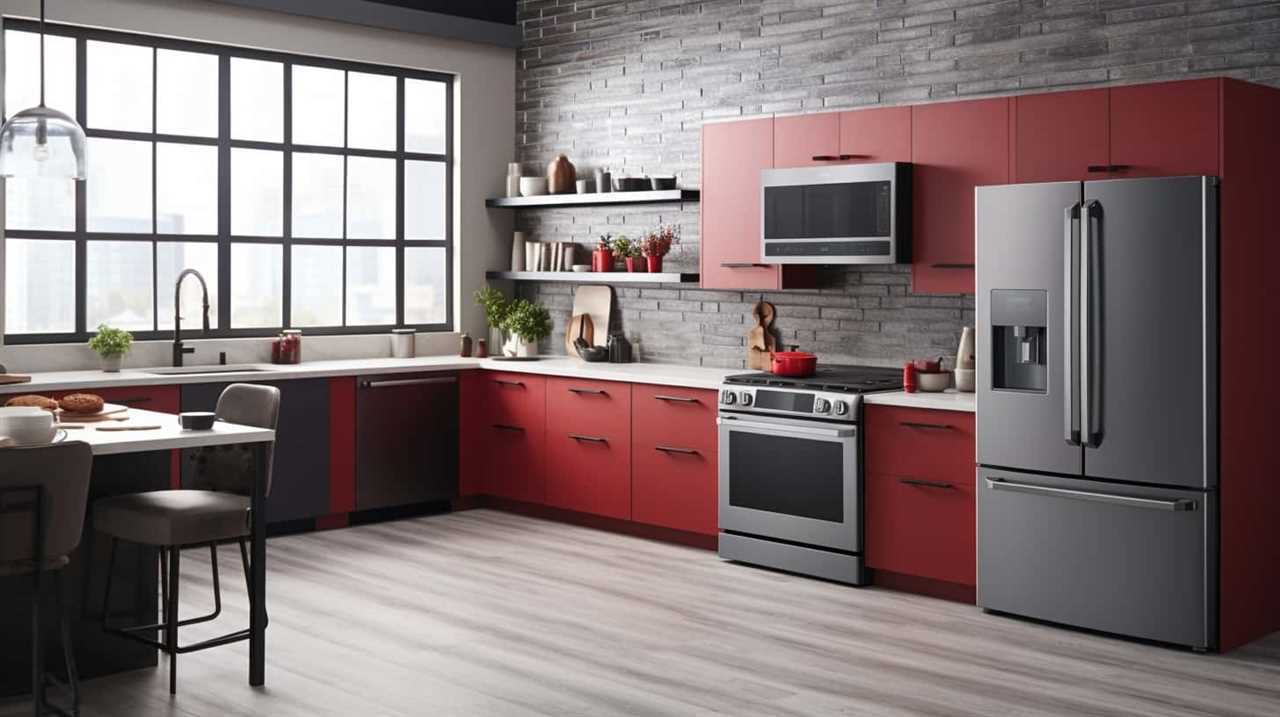
- Inventory management challenges: Limited inventory availability can be attributed to poor inventory management practices. This includes inaccurate forecasting, insufficient stock levels, and ineffective replenishment strategies.
- Increased demand: The current surge in appliance purchases has put a strain on supply chains, leading to limited inventory availability. Manufacturers are struggling to keep up with the high demand, resulting in delays in delivery.
- Supply chain disruptions: The COVID-19 pandemic has severely impacted global supply chains, causing disruptions in manufacturing and distribution. These disruptions have further exacerbated the limited inventory availability of appliances.
- Customer satisfaction concerns: Limited inventory availability directly affects customer satisfaction. When customers are unable to receive their appliances in a timely manner, it can lead to frustration and disappointment. This can ultimately impact the overall customer experience and loyalty.
To address these challenges, it’s crucial for retailers and manufacturers to improve their inventory management practices, collaborate closely with suppliers, and invest in technology to enhance forecasting accuracy and optimize stock levels. By doing so, they can ensure a smoother delivery process and enhance customer satisfaction.
Inefficient Scheduling and Logistics
Improving scheduling and logistics is essential in addressing appliance delivery delays. Inefficient scheduling optimization and logistics coordination improvements can lead to delays and inconveniences for customers. It’s crucial for companies to have a well-organized and efficient system in place to ensure that deliveries are made on time and without any complications.
One of the main causes of appliance delivery delays is inefficient scheduling. When delivery routes aren’t properly planned or optimized, it can result in delays and inefficiencies. By implementing scheduling optimization techniques, such as using advanced algorithms and predictive analytics, companies can streamline their delivery processes and ensure that deliveries are made in the most efficient way possible.
Another factor that contributes to delivery delays is poor logistics coordination. When there’s a lack of communication and coordination between different teams involved in the delivery process, it can lead to delays and mismanagement. By improving logistics coordination through better communication and collaboration, companies can minimize delays and ensure that deliveries are made on time.

Inefficient scheduling and logistics coordination can significantly impact appliance delivery times. By optimizing scheduling and improving logistics coordination, companies can address these issues and provide a better delivery experience for their customers. However, another important aspect to consider is the lack of communication and transparency, which will be discussed in the next section.
Lack of Communication and Transparency
How can we ensure effective communication and transparency to minimize appliance delivery delays?
Here are four ways to address the issue of communication breakdowns and alleviate customer frustration:
- Real-time updates: Provide customers with accurate delivery ETAs and frequent updates through automated text messages or online tracking systems. This helps manage expectations and keeps customers informed throughout the delivery process.
- Clear communication channels: Offer various communication channels (phone, email, live chat) and ensure prompt responses to customer inquiries. This allows customers to easily reach out with questions or concerns and receive timely assistance.
- Transparent policies: Clearly communicate delivery policies, including any potential delays or disruptions, upfront. Provide detailed information on the steps being taken to resolve any issues and keep customers informed throughout the process.
- Customer feedback loop: Establish a feedback system to gather input from customers regarding their delivery experience. Use this feedback to identify areas for improvement and make necessary changes to enhance communication and transparency.
Frequently Asked Questions
How Can Customers Track the Status of Their Appliance Delivery?
We offer various tracking options for customers to easily monitor the status of their appliance delivery. Our customer support team is also available to provide assistance and updates throughout the process.
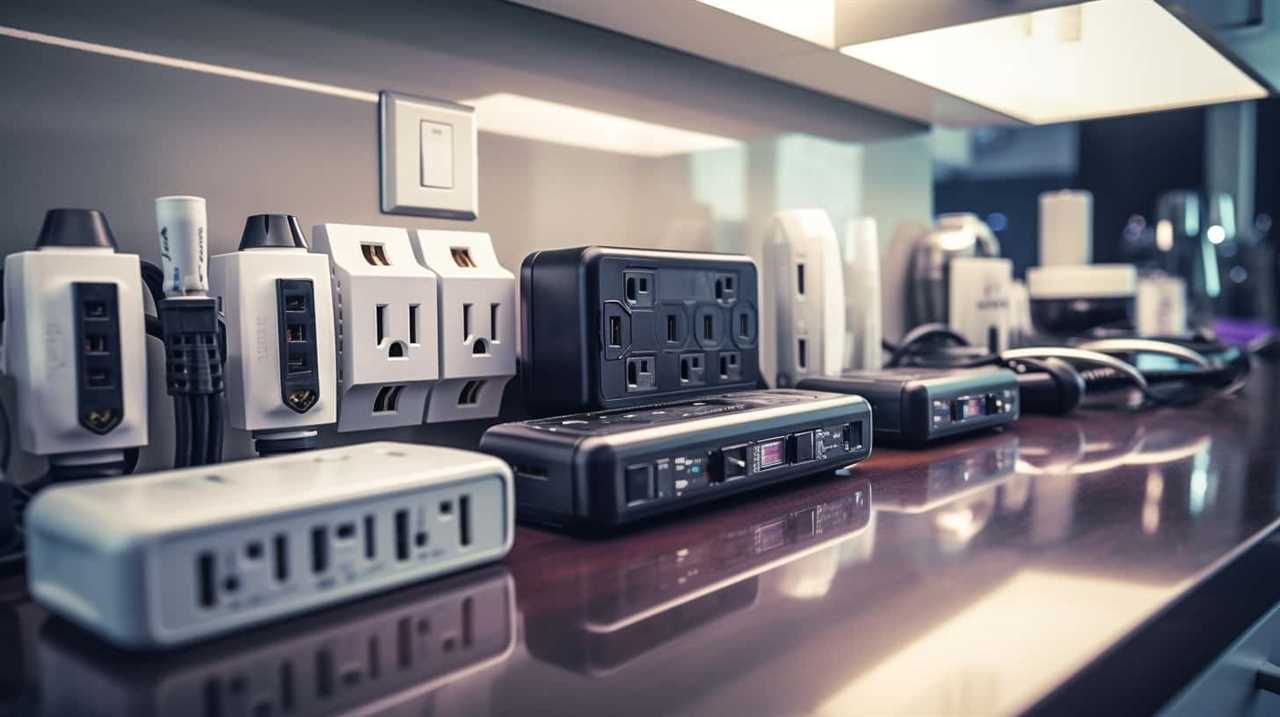
Are There Any Alternative Delivery Options Available for Customers Experiencing Delays?
There are alternative delivery options available for customers experiencing delays. We understand the importance of customer satisfaction and offer solutions such as expedited shipping or in-store pickup to ensure prompt delivery of appliances.
What Steps Are Appliance Manufacturers Taking to Address Manufacturing Delays?
Appliance manufacturers are actively addressing manufacturing delays through various manufacturing improvements and supply chain optimizations. These steps are taken to ensure better efficiency and timely delivery of appliances to meet customer demands.
How Are Retailers Addressing the Limited Inventory Availability?
Retailers are working tirelessly to address the challenges of limited inventory availability. We understand your frustration and are actively seeking solutions to ensure you have access to the appliances you need. Rest assured, we’re on it.
What Measures Are Being Taken to Improve Communication and Transparency Regarding Delivery Delays?
Improving customer satisfaction and enhancing delivery logistics are key focuses. We are implementing measures to improve communication and transparency regarding delivery delays. Our goal is to keep customers informed throughout the process.

What Is Causing Delays in Appliance Delivery, and Does Appliance Direct Offer Free Delivery?
Appliance Direct offers free delivery on all purchases, but delays in appliance delivery can be caused by high demand, supply chain disruptions, or logistic issues. Despite these challenges, Appliance Direct remains committed to providing free and efficient delivery service for all customers.
Conclusion
In conclusion, the current delays in appliance delivery can be attributed to various factors such as:
- Increased demand
- Supply chain disruptions
- Shortage of delivery personnel
Global shipping challenges and manufacturing delays further contribute to the problem. Additionally, limited inventory availability, inefficient scheduling, and lack of communication and transparency exacerbate the situation.
Despite these challenges, we’re committed to addressing these issues and providing our customers with a seamless and efficient delivery experience.




